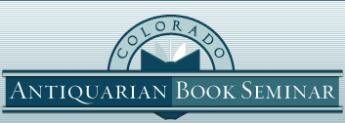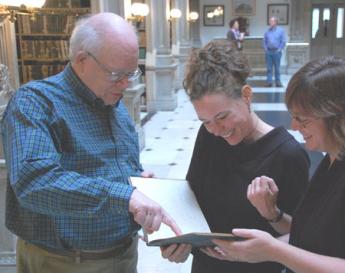Antiquarian Booksellers' Association of America Tavistock Books
Colorado Antiquarian Book Seminar - A Post-CABS Report from Margueritte Peterson

Last month Tavistock Books’ fearless Girl Friday, Margueritte Peterson headed out to Colorado Springs to attend the Colorado Antiquarian Book Seminar (CABS). The week-long seminar is led by consummate experts in the field of rare and antiquarian bookselling, librarianship, and bibliography, making it an exceptional learning environment for booksellers, librarians, and collectors alike. Margueritte was one of approximately 40 participants at this year’s seminar, and was excited to share her experience with everyone.
Why did you decide to attend CABS?
MP: I’m pretty new to the book trade, and CABS seemed like the perfect opportunity to further my knowledge in areas that would be immediately applicable to my work at Tavistock Books. I spend a lot of time researching, cataloguing, and photographing books – not to mention simply handling them in the store each day! I knew that CABS would provide me the knowledge and experience to do all of these things even better.
Describe a typical day at CABS.
MP: After breakfast in the dining hall, we’d begin at 8:30. Each day included four or five sessions, led by different members of the faculty. After each presentation, there was time for questions and answers, which was an awesome opportunity to ask about specifics or delve even more deeply into each topic. We all ate lunch together, so there was also ample opportunity to sit with faculty members and ask questions or get to know each other less formally.
In the evenings, there was more time to socialize with one another, to talk about the day’s presentations, or prepare for the following day. Most of us – including several members of the faculty – wound up at the picnic tables outside the on-campus lodge, and I’d highly recommend that anyone who attends CABS stay on campus to reap the benefits of getting to know both the faculty and fellow seminarians. We also visited a few local booksellers, who graciously welcomed us.
What were some of the strengths of the faculty?
MP: I was consistently impressed by every faculty member’s passion for the book trade, and by their enthusiasm for inspiring us to excellence. Each of them also really had a niche, some particular aspect of the trade they were passionate about. Terry Belanger, for instance, always insisted that we use precise language in bibliographic description; he argued that you shouldn’t describe a book as bound in morocco unless you were absolutely sure it was morocco – otherwise, you should say “goat”! And Rob Rulon-Miller made an impassioned plea that we never use tape for packing and shipping books.
But what struck me about the faculty was their collegiality, even when they strongly disagreed with one another (which happened more frequently than you’d expect!) Their interactions with each other and with us reminded everyone that this is a trade where there’s room for people with a variety of experiences, specialties, and interests. And though there are certainly best practices, there is no one “right” way to be successful in the trade. [See a complete list of this year's faculty below.]
What did you take away from CABS?
MP: Oh, goodness, where do I start? Michael Suarez, the director of Rare Book School, gave an incredible keynote address on our first night. He talked about the “ecosystem of value” in the circulation of rare and antiquarian books. Dr. Suarez challenged us to think about collecting and selling rare books within a different framework, of thinking about the trade differently. And that was an important theme for the week: thinking about what we do as booksellers differently, critically. Whether we were discussing digital databases with Dan Gregory or learning about selling books to libraries from Dan DeSimone and Lorne Bair, we were constantly pushed to expand our own understanding and to question presuppositions.
From a practical standpoint, I also got an introduction to other aspects of the trade that I was less familiar with. I didn’t know much about early books or about auctions, for instance. Nina Musinsky gave a fantastic presentation on the former, and we actually did a live auction on Thursday. The curriculum was even more thorough than I’d anticipated, and it seemed to resonate with both people who were brand new to bookselling and those who’d been in the trade for decades.
CABS History and Faculty
Originally called the Antiquarian Book Market Seminar, the Colorado Antiquarian Book Seminar launched in 1978 thanks to a collaboration between Dean Margaret Goggin of the Graduate School of Librarianship and Information at the University of Denver and Jacob Chernofsky, editor and publisher of AB Bookman’s Weekly. In the ensuing 35 years, hundreds of booksellers, librarians, and collectors have attended this bibliophilic seminar and are proud to call themselves alumni of this intense week-long event. If you’re thinking of attending….DO! You won’t be disappointed. Numerous scholarships are available. Margueritte would like to use this opportunity to thank the good folks at Advanced Book Exchange (ABE), as she was this year’s recipient of their annual CABS scholarship, without which she would not have been able to attend CABS this year.
Faculty Biographies
Michael Suarez: This year’s keynote speaker, Dr. Michael Suarez is University Professor and Director of Rare Book school at the University of Virginia. In addition to holding multiple prestigious research fellowships, he is Honorary Curator of the University of Virginia’s special collections and Professor of English. Dr. Suarez recently published The Oxford Companion to the Book, a truly impressive and indispensable million-word reference work on the history of books and manuscripts.
Lorne Bair: After obtaining degrees in Biology, English Literature and Creative Writing from Virginia Tech and the University of Maryland, Lorne Bair began his career in antiquarian bookselling working as a scout for Powell’s Books and answering queries in Bookman’s Weekly. He ran his own open shop in Winchester, Virginia from 1996 to 2002. Since 2002, Bair has specialized in American Radical History and Social Movements. He’s currently Chair of the Southeast Chapter of the ABAA.
Terry Belanger: In 1971, Terry Belanger established the Book Arts Press at Columbia University as a bibliographical laboratory to support a program to train antiquarian booksellers and rare book and special collections librarians. He founded Rare Book School in 1983 and moved both programs to the University of Virginia in 1992. He retired there as University Professor and Honorary Curator of Special Collections in 2009.
Sally Burdon: Sally Burdon joined her mother, Barbara Burdon, in the operation of an antiquarian and secondhand book business in Canberra, Australia in 1982. For many years, The Old Bookroom was a generalist shop with a specialization in Asian material. Just over ten years ago, Sally made the decision to deal only in Asian material and renamed the business The Asia Bookroom. The transition proved quite the success, and the shop is thriving. Sally is currently President of the Australian and New Zealand Association of Antiquarian Booksellers (ANZAAB).
Daniel DeSimone: Since January 2000, Dan DeSimone has been Curator of the Lessing J Rosenwald Collection of the Library of Congress. Prior to venturing into librarianship, DeSimone ran his own rare book company in New York City, developing a special expertise in antiquarian bibliography and illustrated books. He’s since cultivated additional expertise in early printing and early printed books.
Dan Gregory: Dan Gregory has been a full-time bookseller since 1990 and from 1996 to 2012 was the General Manager of Between the Covers Rare Books. He specializes in developing computer systems for booksellers, rare book photography, marketing, and catalogue design. Though Dan is now Williams Lea Presentation Specialist at Aberdeen Asset Management, Inc, he remains incredibly involved in the world of antiquarian books.
Kevin Royal Johnson: A specialist in modern literature, cinema, art, and photography, Kevin Johnson has been proprietor of Royal Rare Books since 1997. In 2007, Oak Knoll Press published his first book, The Dark Page, a full-color guide to the first edition sources for American film noir of the 1940′s. He published the second volume covering 1950 to 1965, The Dark Page II, in 2009. Johnson has been a member of the ABAA since 2002.
Nina Musinsky: Nina Musinsky worked in Paris and New York as a private library curator and consultant and as a specialist in rare and antiquarian books at Christie’s New York. Since 2003, she’s been independent proprietor of Musinsky Rare Books, dealing in fifteenth- to early nineteenth-century Western European printed books and manuscripts. Musinsky is currently Chair of the Mid-Atlantic Chapter of the ABAA and a member of the Council of the Bibliographical Society of America.
David Prendergast: The proprietor of Stick Figure Books since 2008, David Prendergast says that he was well prepared for the trade by his work at non-profit anti-hunger organizations in the US and around the world. Prendergast brings special expertise in the area of new and emerging technologies, and he offers a unique perspective that’s often especially relevant to new booksellers.
Robert Rulon-Miller, Jr: Rob Rulon-Miller has been involved in the rare book trade since he was a teenager helping with the family business. He started Rulon-Miller Books in 1982 in Minneapolis, Minnesota. Rulon-Miller served as President of the ABAA from 1994 to 1996 and has served on numerous ABAA committees.
Steven Escar Smith: Dean of Libraries and Professor at the University of Tennessee, Steve Smith holds a joint appointment in the School of Information Science at Tennessee. Before joining the University of Tennessee, Smith worked for 21 years at the Texas A&M University Libraries, where he held the C. Clifford Wendler Professorship and multiple administrative posts, along with adjunct appointments on the Graduate Faculty of the Texas A&M English Department and in the School of Library and Information science at the University of Texas.
(Posted on the Tavistock Books Blog, presented here by permission of Vic Zoschak.)

